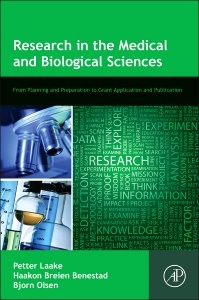Research in Medical and Biological Sciences From Planning and Preparation to Grant Application and Publication
Coordonnateurs : Laake Petter, Benestad Haakon Breien, Olsen Bjorn R.

Research in Medical and Biological Sciences covers the wide range of topics that a researcher must be familiar with in order to become a successful biomedical scientist. Perfect for aspiring as well as practicing professionals in the medical and biological sciences, this publication discusses a broad range of topics that are common yet not traditionally considered part of formal curricula, including philosophy of science, ethics, statistics, and grant applications. The information presented in this book also facilitates communication across conventional disciplinary boundaries, in line with the increasingly multidisciplinary nature of modern research projects.
1. Philosophy of science
2. Ethics and scientific conduct
3. Ethics in human and animal studies
4. Research strategies, planning, and analysis
5. Literature search methods and bibliographic tools
6. Basic medical science
7. Translational medical research
8. Clinical research
9. Epidemiology
10. Qualitative research methods
11. Statistical inference
12. Evidence-based practice and systematic reviews
13. Scientific communication
14. Successful lecturing
15. Guide to grant applications
Postgraduate researchers in basic life science and clinical research, postdocs, researchers and clinical researchers.
Professor, MD Haakon Breien Benestad has since 1968 been a staff member of the Institute of Basic Medical Sciences, Department of Physiology, University of Oslo. He has lectured students of medicine, odontology, nutrition and physiotherapy and has been an advisor for master and postgraduate students. He has held various basic courses for postgraduate students, compiled compendia for these courses and written a textbook of anatomy, physiology and immunology for social and health studies in upper secondary schools.
Dr. Bjorn R. Olsen, Hersey Professor of Cell Biology at Harvard Medical School and Professor of Developmental Biology at Harvard School of Dental Medicine, received his MD and PhD degrees in 1967 from the University of Oslo, Norway. In 1971, he moved to the United States and joined the faculty at Rutgers Medical School, now Rutgers Robert Wood Johnson Medical School, where he was Professor of Biochemistry from 1976 until he moved to Harvard Medical School in 1985 as Hersey Professor of Anatomy and Cell Biology.
Research in his laboratory has uncovered fundamental roles of collagens, transcription factors and receptors that affect skeletal development and homeostasis, angiogenesis and blood vessel morphogenesis. Work on the roles of extracellular proteins in tissue development led to discovery of several novel families of non-fibrillar collagens and uncovered disease mechanisms in many collagen-bas
- Provides a broad scientific perspective in basic, clinical and translational medical research, which is perfect for students with various professional backgrounds
- Contains easily accessible, concise material that makes learning about diverse methods achievable in today's fast-paced world
- Includes extensive examples, online resources such as further reading suggestions, and data files for statistical analyses
- Covers the breadth of topics, including research strategies, bibliographic tools and scientific communication, that a researcher must understand in order to be a successful scientist
Date de parution : 06-2015
Ouvrage de 584 p.
15x22.8 cm
Thèmes de Research in Medical and Biological Sciences :
Mots-clés :
Alert services; Analysis; Animal biomedical research ethics; Animal studies; Aquaporin; Aspirin; Association; Audience attentiveness; Authorship; BIOSIS Previews; Bias; Blinding; CINAHL; Case-control study; Causality; Causation; Cell culture; Clear writing; Cochrane Collaboration; Cochrane Library; Cohort study; Confidence interval; Contingency tables; Correspondence; Cox regression; Cross-sectional study; Disease models; Dissemination; Drug target; Druggability; Drugs; EMBASE; Effect estimate; Effect measure; Emergence; Empiricism; EndNote; Ethics of science; European Union's Horizon 2020; Evidence pyramid; Evidence-based medicine; Experimental and observational studies; Experimental checklist; Experimental strategy; Explanation; Fabrication; Falsification; Figures; Fixed effects; Forest plot; Fraud; Funnel plot; Generalization; Genetic manipulation techniques; Goals; Grant funding; Grant review criteria; Grant writing; Helsinki Declaration; Hermeneutics; Heterogeneity; Human biomedical research ethics; Hypothesis testing; IMRAD structure; Idealism; Importance; Incidence; Inference; Informed consent; International research collaboration; Intervention; Investigator-initiated grants; Lecture delivery; Lecture preparation; Linear regression; Literature search; Logistic regression; MacPLUS; Median regression; Medline; Meta-analysis; Methodology filters; Misconduct in authorship; Multi-project grants; National Institutes of Health; Nervousness; Nonparametric methods; Objectives; Open access publication; Oral presentation; Orphan drugs; Oviedo Convention; P-value; PICO; Participant observation; Pharmaceutical industry; Pharmaceutical public-private partnership; Philosophy of the social sciences; Placebo; Plagiarism



